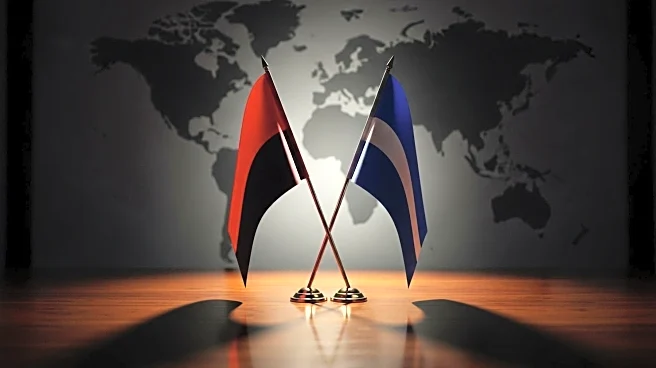What's Happening?
Dmitry Medvedev, deputy chairman of the Kremlin's Security Council and former Russian president, has publicly dismissed the notion that Russia seeks a war with Europe. Medvedev characterized Europe as weak and in decline, stating that Russia has nothing to gain from conflict with the continent. His comments come amid heightened tensions between NATO and Russia, with NATO accusing Russia of airspace violations intended to provoke the alliance. Medvedev's remarks were made on Telegram, where he described Europe as economically dependent on the U.S. and culturally degrading. He emphasized that Russia historically acts as a liberator rather than a conqueror in Europe. Despite dismissing the idea of war, Medvedev acknowledged the risk of accidental conflict, particularly involving weapons of mass destruction, and urged vigilance.
Why It's Important?
Medvedev's statements reflect ongoing geopolitical tensions between Russia and NATO, particularly concerning Ukraine. The accusations of airspace violations by NATO highlight the fragile security situation in Europe, where any misstep could escalate into a broader conflict. Medvedev's dismissal of war intentions may be aimed at reducing immediate fears of conflict, but his acknowledgment of risks underscores the precariousness of the current situation. The implications for U.S. foreign policy are significant, as the U.S. is a key NATO member and has vested interests in European stability. The situation could affect defense strategies, international relations, and economic policies, especially if tensions continue to rise.
What's Next?
The situation may lead to increased diplomatic efforts to de-escalate tensions between NATO and Russia. Stakeholders, including political leaders and international organizations, might seek dialogue to prevent accidental conflict. Monitoring of airspace and military activities could intensify, with potential adjustments in defense postures by NATO countries. The U.S. and its allies may also consider reinforcing their commitments to European security, potentially leading to policy shifts or military deployments.
Beyond the Headlines
Medvedev's comments highlight deeper cultural and ideological divides between Russia and Europe. His portrayal of Europe as culturally degrading and economically dependent suggests a narrative that could influence Russian domestic and foreign policy. The rhetoric may serve to bolster Russian nationalism and justify its actions on the international stage. Additionally, the focus on Europe’s vulnerability could be used to strengthen Russia's position in global negotiations and alliances.








